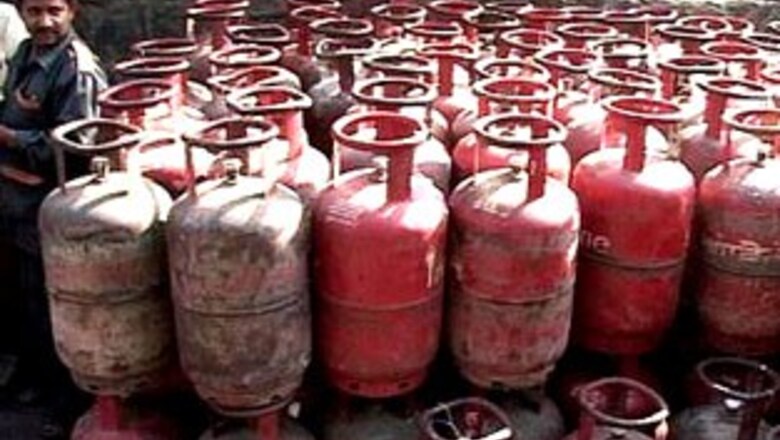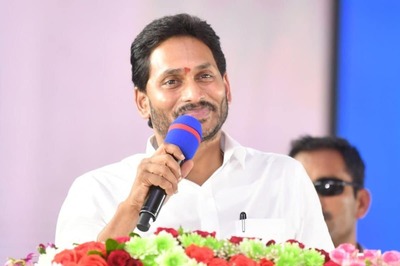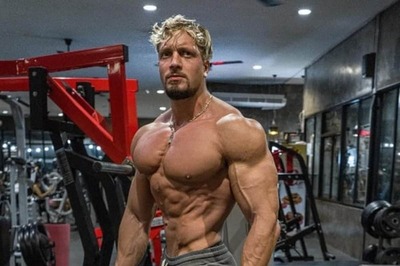
views
New Delhi: A Prime Minister-appointed expert group on Wednesday suggested freeing petrol and diesel prices and called for raising LPG rates by a steep Rs 100 per cylinder and kerosene by Rs 6 a litre.
The recommendations may not be acceptable to the government battling high inflation.
At current global crude oil prices, deregulating auto fuel pricing would result in a hike of Rs 4.72 a litre in petrol prices and a rise of Rs 2.33 per litre in diesel rates.
Considering the cascading effect an increase in diesel rates would have on food prices, this recommendation may not be accepted while there seems to be a consensus between Ministries of Finance and Petroleum on freeing petrol prices.
"Current petroleum product pricing policy of the government is not sustainable," Kirit Parikh, who headed the panel, which also included Finance Secretary Ashok Chawala and Oil Secretary S Sundareshan, said after submitting the report to Petroleum Minister Murli Deora in New Delhi.
At present, kerosene is sold at a discount of Rs 18.06 a litre and domestic LPG cylinder at Rs 287.59. The remainder of the gap between retail price (after the suggested increase) and the imported cost of fuel should be met by the government and by upstream firms ONGC and Oil India.
Parikh, did not see much inflationary pressure because of the measures suggested saying the steps like increase in tax rates needed to bridge the fiscal gap between the retail price and actual cost was unsustainable.
Deora gave enough hints that the government will not take any decision in haste saying the report will be "processed" and presented to the government in a weeks time.
Sources said the government may accept the recommendation of freeing petrol price but may adopt a more calibrated approach on diesel as a rise in transportation cost will further fuel food inflation.
A hike in LPG rates was expected but not as steep as suggested while kerosene may not be touched.
Petrol in Delhi costs Rs 44.63 a litre while diesel is priced at Rs 32.87. A 14.2-kg LPG cylinder costs Rs 281.20 and and kerosene is priced at Rs 9.09 per litre.
Without any increase, Indian Oil, Bharat Petroleum and Hindustan Petroleum are estimated to lose Rs 46,030 crore in revenues this fiscal. As per the current policy, the revenue loss on petrol and diesel is met by upstream firms like ONGC.
Of the Rs 31,574-crore revenue loss expected on LPG and kerosene, the government has so far given Rs 12,000 crore.
He said hikes suggested by the panel in kerosene were in step with the rise in rural per capita income since the last increase was in 1999 (a hike of Rs 2 per litre to Rs 9.09.)
The rise recommended in domestic cooking gas rates was also in proportion to the rise in urban per capital income.
Freeing auto fuel prices, which would promote competition as the present policy has virtually driven private sector out of business, has been suggested after considering its impact on users, he said and added users had the capacity to pay.
PAGE_BREAK
"This is a good time to free prices because petrol and diesel prices increases will be very low," Parikh said. "You would not wait for crude to touch $120 a barrel again."
"There is no escaping from passing on the international price (to consumers)," he said.
The committee suggested that LPG and kerosene prices can be raised every year in step with the growth in per capital agricultural GDP at nominal rates and per capita income respectively.
Parikh said the fiscal deficit-led inflation (rise in prices of essential commodities caused because of the government having to take fiscal measures like tax hikes and borrowings) effects everyone including the poor and farmers.
Freeing petrol and diesel prices will not only promote competition but also lead to more equitable sharing of inflation burden, affecting mostly people who can pay.
"We have examined the implications of increase in retail price of diesel on various groups of consumers and do not find any compelling reason to subsidise them," the report said.
"The present system of price control on petrol and diesel in particular has resulted in major imbalances in the consumption pattern of petroleum products in the country, and has put undue stress on finances of the PSU oil marketing companies as well as of the Government," he said.
Parikh said a transparent and effective distribution system for PDS kerosene and domestic LPG can be ensured through smart cards. Until that becomes operations, kerosene allocation across states should be rationalised which would bring down all-India allocation by at least 20 per cent.
The panel did not recommend a windfall profit tax saying the Oil Ministry ought to have flexibility in mopping up incremental incomes of ONGC and Oil India for purpose of meeting a part of fuel subsidies.
At present, the government does not allow state-running fuel retailers to fix petrol, diesel, kerosene and LPG prices in line with international cost, resulting in huge revenue losses for the companies and subsidy burden on government.
This "has led to withdrawal of private sector oil marketing companies (like Reliance Industries) from the market. This has affected competition in the domestic petroleum product market," Parikh said.
"A viable policy has to be workable over a wide range of international oil prices... It should limit the fiscal burden on government and keep the domestic oil industry financially healthy and competitive," he said.
Parikh said petrol and diesel pricing should be left to the competitive market process, while government can continue to subsidise PDS kerosene and domestic LPG to some extent.
Deora said that the report will be processed and will be put in before the government or the Cabinet in a week.
"We are very keen not just to discuss but see what best can be done for the consumers and the Government," he said.
The Government had in September last year constituted an expert committee headed by Kirit Parikh to suggest reform in pricing of oil-products.
This is the third committee on the subject. Panels headed by C Rangarajan, Chairman of the Prime Minister's Economic Advisory Council, made recommendations in 2006 followed by Planning Commission member BK Chaturvedi in 2008.




















Comments
0 comment